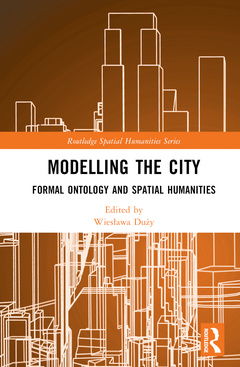Modelling the City Formal Ontology and Spatial Humanities Routledge Spatial Humanities Series
Coordonnateur : Duży Wiesława

Modelling the City focuses on European towns and cities, analysing the opportunities and limitations of modelling of urban space.
This book examines how urban space from the past is discovered, explained and presented. It discusses the multitude of historical sources mediating the past urban space, and the structural, technical, and epistemological issues raised around building a domain ontology, including continuity, and change within urban forms and functions.
Presentation of a formal domain ontology in spatial humanities makes this book unique and worth reading. It is strongly recommended to readers interested in the linked open data approach to research, data standards in Digital Humanities, urban planning, and old maps.
I. Introduction How To Build A Solid House, Or About The Historical Ontology Of The Urban Space ProjectII. Media, sources, data model 1. Modelling As A Bridge Between Maps, Spatial Concepts, And The Territory; 2. An Ontology Of Geographical Places And Their Spatiotemporal, Social Evolution In The Context Of An Extension Of The CIDOC CRM For The Humanities And Social Sciences (SDHSS); 3. Naming the parts: identifying key features within the urban landscapes of Britain circa 1900III. Investigating urban space 4. Narrating Szczecin. Creation of urban authenticity through touristic city trails; 5. How names transform space: The change of street names in Poznań and Gdynia in the nineteenth and twentieth centuries; 6. Uncertain information and spatial objects. Examples from works on the HOUSe project and the European Historic Towns Atlas series, Anna-Lena Schumacher IV. Mapping objects in urban space 7. Database of Topographic Objects 10k as the basis of the Historical Ontology of Urban Space ontology – construction, verification, validation; 8. Cartography and the city: Exploring urban ontologies through historic town-maps; 9. Changes in spatial development of Lviv from the second half of 18th century to the present day; Index
Wiesława Duży is Assistant Professor at the Department of Historical Atlas at the Institute of History, Polish Academy of Sciences. She is also part of a project at the Faculty of History, “People, Places, and Events” of the University of Warsaw, Poland. Her research interests include social history of the eighteenth and nineteenth centuries, domain ontologies in the Humanities and spatial historical databases.
Date de parution : 06-2024
15.6x23.4 cm
Thème de Modelling the City :
Mots-clés :
Modelling the City; european towns; urban space; spatial humanities; domain ontology


